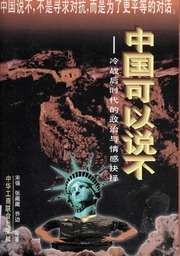China Can Say No
 | |
| Author |
|
|---|---|
| Country | China |
| Published | 1996 |
| Publisher | China Federation of Literary and Art Circles Publishing (中国文联出版社) |
| ISBN | 7505925458 |
| OCLC | 953046578 |
| Chinese name | |
| Simplified Chinese | 《中国可以说不:冷战后时代的政治与情感抉择》 |
| Traditional Chinese | 《中國可以說不:冷戰後時代的政治與情感抉擇》 |
| Hanyu Pinyin | Zhōngguó kěyǐ shuō bù: Lěngzhànhòu shídài de zhèngzhì yǔ qínggǎn juézé |
China Can Say No (中国可以说不) is a 1996 Chinese language non-fiction bestseller written and edited by Song Qiang, Zhang Zangzang (whose original name is Zhang Xiaobo), Qiao Bian, Tang Zhengyu, and Gu Qingsheng. It was published in China and strongly expresses Chinese nationalism. Its full title is often translated as The China That Can Say No: Political and Emotional Choices in the post Cold-War era.
Authors
Zhang Xiaobo, one of the authors of China Can Say No, is a former student radical and "uncritical admirer of all things American". His disillusionment with foreign countries' treatment of China, and particularly that by America, reflects the experience of about a quarter of Chinese students studying in the United States, who despite initially feelings of Americophilia, undergo a surge in pro-China patriotism following the experience. Contributing factors to this transformation include feelings of racial discrimination while in the United States, a denial of Chinese culture's legitimacy by Americans, and negative images of China from the American media.[1]
Contents
The book, which is modelled on The Japan That Can Say No, argues that many "fourth-generation" Chinese embraced Western values too strongly in the 1980s and disregarded their heritage and background. Surprisingly, all of the authors were strong critics of Chinese government, and at least two of the authors participated in the Tiananmen Square protests of 1989. Another author was sentenced to seven years in jail by the Chinese government in the 1980s for his pro-democracy activities, though he was released after only serving three years. The book specifically criticizes a number of activists such as physicist Fang Lizhi and journalist Liu Binyan.
Describing a disenchantment among Chinese with the US starting in the 1990s, especially after it adopted a China containment strategy, rejected China's bid for the World Trade Organization, and worked against China's bid for the 2000 Summer Olympics, the authors criticize US foreign policy (in particular, support for Taiwan) and American individualism. The book deplores unfair treatment of China by the US (as symbolized by the Yinhe Incident of 1993). It claims that China is used as a scapegoat for American problems and voices support for such governments as that of Fidel Castro's Cuba which openly declare their opposition to the US. The book also focuses on Japan. It accuses Japan of being a client state of the US, argues that Japan should not get a seat on the United Nations Security Council, and supports a renewed call for war reparations to China from Japan for its actions in the Second Sino-Japanese War.
A Japanese translation by Mo Bangfu and Suzuki Kaori was published in 1996 by Nikkei.[2] No English translation has been published.
Sequel
In 2009, Unhappy China, a follow-up version, was published.